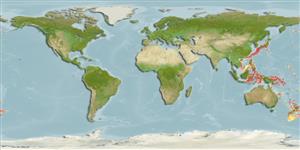>
Gadiformes (Cods) >
Macrouridae (Grenadiers or rattails)
Etymology: Hymenocephalus: Named for its transparent membrane-like head covering (‘‘hymen head’’) and fragile nature of head bones (Ref. 100825).
More on authors: Jordan & Gilbert.
Environment: milieu / climate zone / depth range / distribution range
Οικολογία
Θαλασσινό(ά) βαθύβιο(ς); εύρος βάθους 220 - 810 m (Ref. 41299). Deep-water
Western Pacific: southern Japan to the Philippines.
Μέγεθος / Βάρος / Age
Maturity: Lm ? range ? - ? cm
Max length : 14.0 cm TL αρσενικό/απροσδιόριστο; (Ref. 559)
This species is distinguished by the following characters: pelvic fin rays 11 (rarely 12); pectoral fin rays 13-15; projecting snout, 20-25% HL; no barbel; moderate orbit diameter, 30-33% HL; infraorbital width 13-15% HL; moderately long preopercular supporter, with obtuse angle at rear margin, 3-5% HL; 20-26 gill rakers; ventral striae reaching to ½ distance from pelvic fin bases to periproct; otolith has moderately high predorsal lobe, with colliculi separated, widely placed across collum, terminating at some distance from anterior and posterior rims of otolith; otolith length to height (OL:OH), 1.05-1.1; total colliculum length to pseudocolliculum length (TCL:PCL), 2.4-2.6 (Ref. 98298).
Minimum depth from Ref. 26282.
Life cycle and mating behavior
Γεννητική Ωρίμανση | Αναπαραγωγή | Γεννοβολία | Αβγά | Γονιμότητα | Προνύμφες
Masuda, H., K. Amaoka, C. Araga, T. Uyeno and T. Yoshino, 1984. The fishes of the Japanese Archipelago. Vol. 1. Tokai University Press, Tokyo, Japan. 437 p. (text). (Ref. 559)
IUCN Red List Status (Ref. 130435: Version 2024-2)
Threat to humans
Harmless
Human uses
Εργαλεία
Special reports
Download XML
Διαδικτυακές πηγές
Estimates based on models
Preferred temperature (Ref.
123201): 6.9 - 13, mean 9.3 °C (based on 172 cells).
Phylogenetic diversity index (Ref.
82804): PD
50 = 0.5000 [Uniqueness, from 0.5 = low to 2.0 = high].
Bayesian length-weight: a=0.00214 (0.00109 - 0.00421), b=3.20 (3.03 - 3.37), in cm total length, based on LWR estimates for this (Sub)family-body shape (Ref.
93245).
Τροφικό Επίπεδο (Ref.
69278): 3.2 ±0.40 se; based on food items.
Ελαστικότητα (Ref.
120179): Μεσαίο(α), ελάχιστος χρόνος για διπλασιασμό πληθυσμού 1,4 - 4,4 έτη (Assuming tmax>3).
Fishing Vulnerability (Ref.
59153): Low vulnerability (10 of 100).
